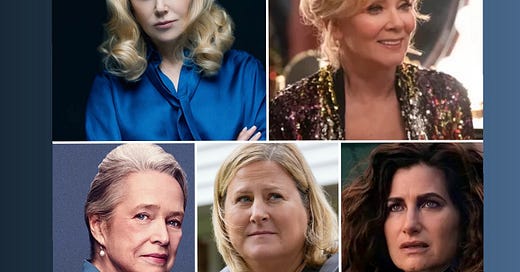Why Is Nicole Kidman Always on My TV Now?
How embracing the menopausal years is giving some of our greatest actresses the best roles of their lives on the small screen. And how we can still do better.

On the TV series Ugly Betty, magazine empire matriarch Claire Meade dares to launch her own magazine for menopausal women, Hot Flash, after she gets out of prison for murdering her husband’s mistress. This is treated as a joke and a major corporate liability. “Oh my God, look at this!” Regis Philbin quips during an interview meant to promote the magazine. “‘Brittle and horny? Afraid your bones will crack in the sack?’ Been there, done that!”
This was 2008, and things were different then.
Suddenly, menopause is everywhere. My friend Pauline texted our group chat recently, “Does menopause have a new publicist?” The New York Times has celebrated “the Menopause Queen” and wondered, “What Could a Menopause-Friendly Workplace Look Like?” The Washington Post declared that “Perimenopause is having a millennial moment” and documented the ways that famous and powerful Gen X women are using their platforms to speak out about “the change,” as it used to be called, from Samantha Bee to Halle Berry and Drew Barrymore, all of them clearly flabbergasted that it hasn’t been addressed openly and without shame by previous generations. Naomi Watts started a wellness brand, Stripes Beauty, to help women with the transition, recognizing, correctly, that perimenopausal women are a vast untapped market. Miranda July’s bestselling novel All Fours, Demi Moore’s body horror movie The Substance, Pamela Anderson’s acclaimed turn in The Last Showgirl, and Amy Adams’ motherhood satire Nightbitch are among recent works that address midlife women’s unique problems.
But TV has become a unique refuge for midlife-or-older women: Elsbeth, Agatha All Along, Hacks, Somebody Somewhere, Matlock, The Diplomat, Girls5Eva, Bad Sisters, and the rollicking British menopause comedy The Change. Gen X women (and those elder Millennials) are refusing to slink away quietly just because their fertile years have begun to wane.
Subscribe to read Kathryn Hahn’s thoughts about aging women on TV, why representation is important to midlife women, and the Nicole Kidman of it all.




